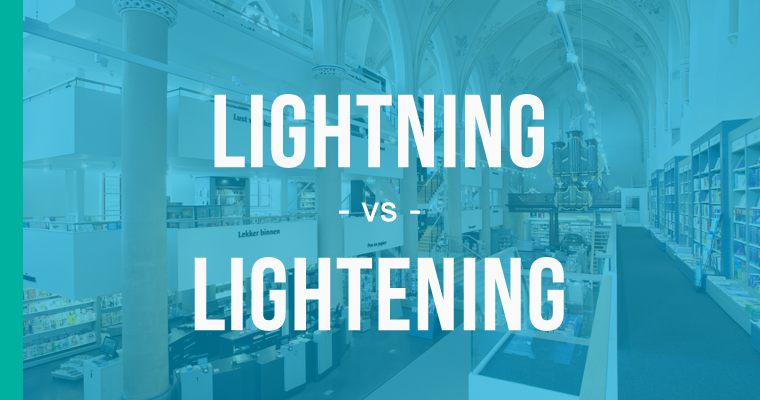Lightning or Lightening – How to Use Each Correctly

What’s the Difference Between Lightning and Lightening?
Contents
Lightning and lightening are near homophones. They sound almost exactly alike but have different meanings.
Lightning can be a noun, verb, or adjective that refers to the bright flashes of electricity during stormy weather. Pronounce this word with two syllables.
- Lightning struck the old tree on the farm, which made the whole family scream in terror. (noun form)
Lightening is the progressive form of the verb to lighten. This means to become lighter in either weight or color. Pronounce lightening with three syllables.
- The horizon is lightening, which signals the imminent arrival of dawn.
Let’s look at some of the ways to use these words in English.
Using Lightning in a Sentence
When to use lightning: Lightning is a type of weather phenomenon that involves bright flashes of light in the sky and sometimes down to the ground. It can act as a verb, noun, or adjective.
For example:
- Many pets and small children are scared when they see lightning. (noun form)
- Get inside! It’s starting to lightning nearby! (verb form)
- Usain Bolt is as fast as lightning! (adjective form)
There are also some idioms and expressions that use lightning:
- lightning in a bottle: an extremely difficult accomplishment
- The golf novice got a hole in one on her very first try. She’s not likely to catch lightning in a bottle like that again for a long time.
- greased lightning: extremely fast
- Cheetahs are as fast as greased lightning.
- lightning never strikes the same place twice: the same event is unlike to occur twice to the same person
- I know you think you’ll win the lottery again because you won it once before, but lightning never strikes the same place twice.
Using Lightening in a Sentence
When to use lightening: Lightening is the progressive form of the verb to lighten. This means to become more light. It can refer to light in the sense of weight or the opposite of darkness.
For example:
- The electricity isn’t working. We should put out some candles to start lightening the room. It’s too dark in here.
- My husband is always so helpful. For example, he’s always lightening my loading by helping me with whatever is burdening me.
The unconjugated form of the verb as lighten is more common in idioms and expressions. These include:
- to lighten one’s load: to make something easier to handle
- You’re carrying way too many grocery bags. Let me carry some for you to lighten your load.
- to lighten one’s wallet: to spend money
- Rob is off lightening his wallet by buying some new bowling supplies.
- to lighten up: to not be so sad or serious
- I know you’re sad that you failed the test, but try to lighten up! You’ve already been accepted into your dream university, so your test grades in high school don’t matter any more.
To lighten one’s load can be either figurative or literal.
Remembering Lightning vs. Lightening
One way to help you remember when to use lightning is to use its syllabication and spelling. Lightning has fewer letters and fewer syllables than lightening. In other words, it is shorter. Because it is shorter, it is also faster. The short, fast spelling can help remind you of the fast nature of lightning.
Another way to remember the difference between the two words is to use the spelling of lightening. This word contains the letters en in the middle. En is a common suffix added to the end of verb to mean to become more. Other examples of words with en on the end are harden, sweeten, strengthen, lengthen, and heighten. Lighten also means to become more light.
Outside Examples
- A pair of girls exploring Utah’s mountains were struck by lightning, but were able to be rescued thanks to the quick-thinking of their dog. –USA Today
- Lightning strikes have sparked many of the fires and some blazes have been burning for weeks. –LA Times
- Discussions with others will be way too intense. Don’t take the bait. And don’t steamroller over others as well. Lighten up! –Chicago Sun Times
- Or offer to bring fixings for festive but lightened-up cocktails, says Chicago-based registered dietitian Sara Haas. –Chicago Sun Times
Quiz: Lightening vs. Lightning
- When you hear thunder, you know that there must also be ________________.
- I always try to be helpful by _________________ my grandmother’s load when she is carrying something heavy.
- His new car as quick as _______________.
See answers below.
Article Summary
Should I use lightning or lightening? Despite having similar pronunciations, and both dealing with light, these words have no overlap in meaning.
- Lightning refers to the bright electrical flashes during a storm.
- Lightening is a verb that means to be becoming more light.
In short, use lightning when talking about the weather and lightening when talking about weight or becoming less dark.
Answers
- lightning
- lightening
- lightning
